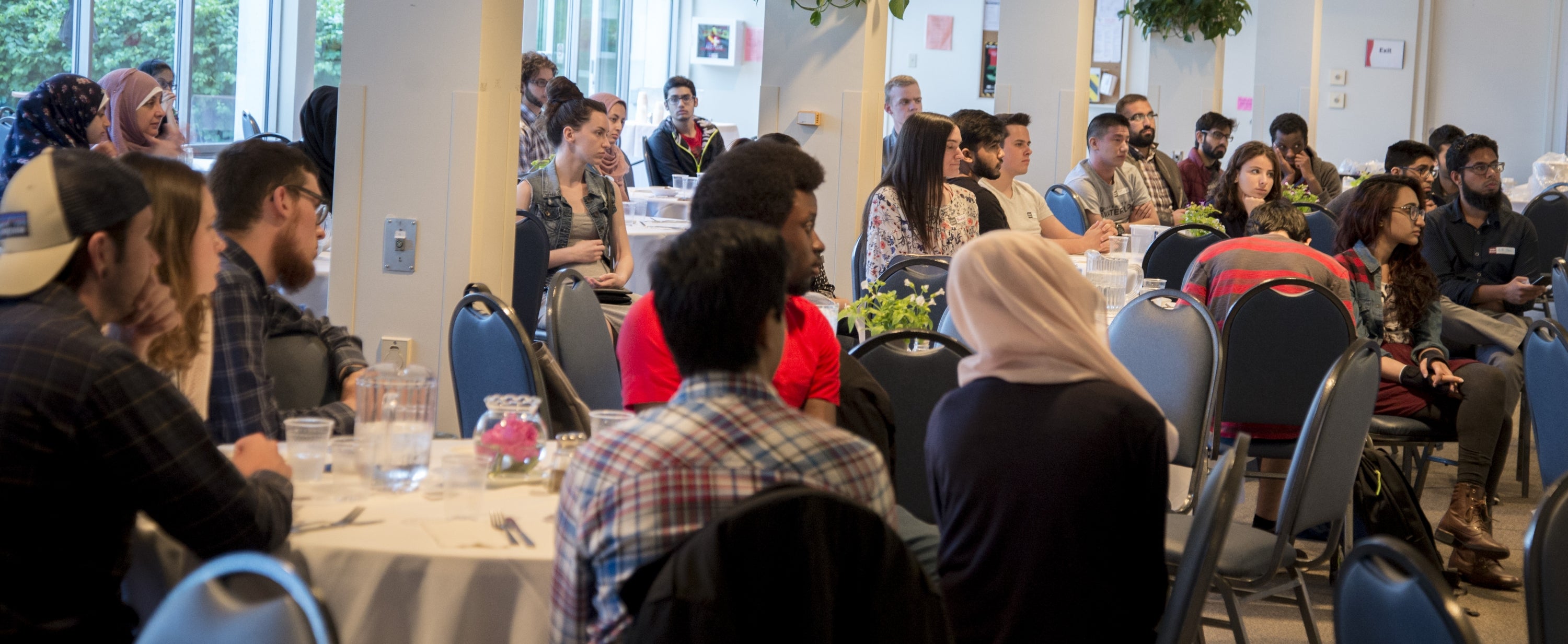
For Muslim students at the University of Waterloo, long spans of fasting during the longest days of the year are over and may already feel like a distant memory. However, it was just a few weeks ago that students were stretching the limits of their bodies as they refrained from eating or drinking each day while the sun was up. This religious practice during Ramadan becomes even more difficult for university students living away from the support of their families for the first time.
The University of Waterloo Muslim Students’ Association (MSA) is a vital source of encouragement on campus during Ramadan, this year serving over 1500 meals over the course of eight regular community dinners after sunset. Conrad Grebel University College students were fortunate to be involved in one of those iftars, in the form of an interfaith fastathon that also raised $502 for Somalian famine relief.
Grebel students listened, shared, and ate with Muslim students at this event. Over the course of the evening, speakers were invited to deconstruct the idea of hunger and what it entails. “How does hunger differ in Waterloo versus Somalia? For students versus the homeless? What does being hungry mean?”
Grebel student Matthew Chase was invited to speak about his understanding of fasting from a Christian Orthodox perspective. “If you can’t control what goes into your mouth, how can you control what comes out of it?” he said. Reflecting back on the event, Chase appreciated the acceptance and hospitality of the evening, similar to a family reunion. Watching others break their fast, Chase described the almost euphoric joint experience of salivating, waiting, and then the reward of food. “It excites my faith!” he remarked. “Your joy becomes my joy.”
Chelsea Campbell enjoyed the community meal, noting the mix of Muslim sects represented. Listening to the stories of other students, Campbell felt encouraged to be more intentional in her faith. “I appreciated the idea of feeling closer to God when fasting. I want that!”
“This is the second year we’ve hosted an iftar dinner with the MSA and we want to continue this as a tradition into the future,” remarked Grebel Chaplain Ed Janzen. “Interfaith dialogue is a learning opportunity for our students and it gives them a comfortable space to share and ask questions openly.” The Grebel dining room was indeed buzzing with conversation, as over a hundred Grebel and UWaterloo students, Wilfrid Laurier and Conestoga College students, and undergrad and grad students shared the meal.
Feeding an iftar dinner to others is a rewarding, charitable act in the Muslim faith, emulating the Prophet Muhammad. Likewise, Christianity teaches followers to love their neighbour. “Therefore it is our responsibility and our opportunity to host people from the university campus,” added Janzen. Iftar dinners are also an important way to help students manage the loneliness of Ramadan, especially when they are not in their family context. “This is one more piece in building a healthy community. It’s a significant investment in the life of Grebel and UWaterloo.”
Echoing the importance of marking Ramadan in community, MSA leader Suleman Azam reflected that the iftar meal at Grebel “felt like a cozy dinner. And as an international student away from family, I can tell you it felt like home.”
According to the MSA, the fastathon is an opportunity for people of different faiths to come together and gain a better understanding of one another. It is also an opportunity to do something to contribute towards the one thing that we all have in common, our humanity, through raising funds to help support those affected by the famine in East Africa.